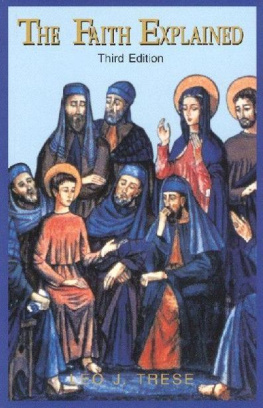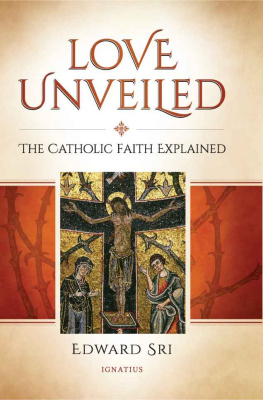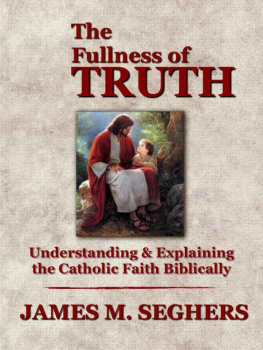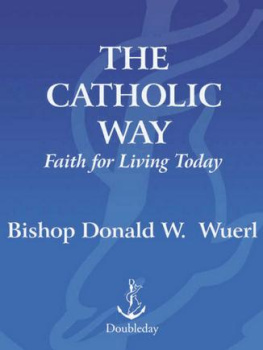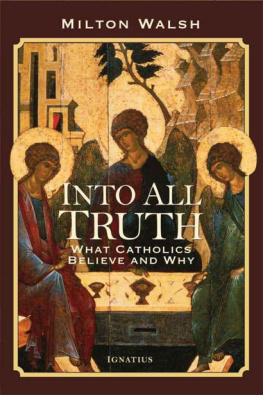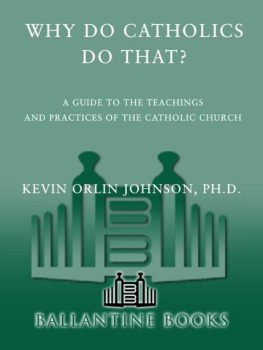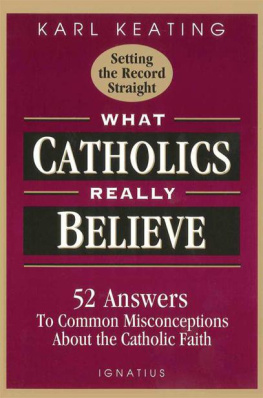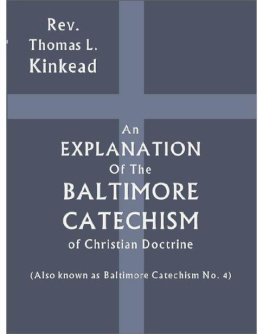
T HE F AITH E XPLAINED
T HE F AITH E XPLAINED
Third Edition
Leo J. Trese

THE FAITH EXPLAINED Third Edition by Leo J. Trese. Copyright 1965 by Fides/Claretian. All Rights Reserved. NIHIL OBSTAT : Louis J. Putz, C.S.C., University of Notre Dame. IMPRIMATUR : Leo A. Pursley, D.D., Bishop of Fort Wayne, Indiana. Published by SCEPTER PUBLISHERS, INC. by special arrangement with Fides/Claretian, Notre Dame, Indiana.
The publishers wish to acknowledge the help of Fr. Robert Bucciarelli in the editing and updating of the Third Edition of this book. This new edition incorporates many changes since the second Vatican Council and the recent changes put into effect by the new Catechism of the Catholic Church .
Sixteenth Printing, 2008
eBook ISBN 978-1-594171-47-5
The cover is a tile painting of the Finding of the Child Jesus in the Temple . (Shrine of Torreciudad, Spain).
SCEPTER PUBLISHERS
PO Box 211, New York, NY 10018.
CONTENTS
THE
CREED
The Purpose of Mans Existence
Is man just a biological accident? Is the human race just another stage in the process of blind and purposeless evolution? Is this human life just a brief flash of light between the long darkness that preceded the womb, and an everlasting darkness that will follow the grave? Am I just a meaningless speck in the universe, tossed off by the creative power of an uncaring God much as a baseball fan might toss a peanut shell over his shoulder? Is there any design or plan to life, any significance? Where did I come from, anyway? And why am I here?
These are questions that any intelligent person is bound to ask himself, once he is old enough to do any serious thinking. We may reduce them to one, Who made us?; and, having answered that, immediately asks, Who is God? But it seems preferable to delay, for the moment, in discussing these two questions, and to begin rather with a consideration of the third. It is equally basic, equally urgent, and is for us a better starting point. The question is, Why did God make us?
There are two ways of answering that question. It depends on whether we look at it from Gods point of view or from our own. Looking at it from Gods point of view the answer is, God made us to show forth his goodness. Since God is a Being infinitely perfect, the main reason why he does anything must be an infinitely perfect reason. But there is only one infinitely perfect reason for doing anything, and that is to do it for God. So it would be unworthy of God, it would be contrary to his infinite perfection, if he were to do something for a reason less than himself.
Perhaps we can see that better if we apply it to ourselves. Even for us, the highest and the best reason for doing anything is to do it for God. If I do something for another human beingeven something noble, like feeding the poorand I do it mainly just for that person, without referring it to God in any way, then it is an imperfect thing that I do. Not a bad thing, but a less perfect thing. That would be true even if I did something for an angel or for our Blessed Mother herself, and left God out of the reckoning. There just is no higher motive for doing anything than to do it for God. That is true of the things that God does, as well as it is true of the things that we do.
The first reason, thenthe big reason why God made the universe and uswas to give glory to himself, by showing forth his infinite power and goodness. His infinite power is shown forth by the fact that we exist. His infinite goodness is shown by the fact that he wills to share his own infinite love and happiness with us. And if it seems to us that God is egotistical to make things just for his own honor and glory, it is because we cant help thinking of God in human terms. We think of him as a creature like ourselves. But the fact remains that there just isnt anything or anyone else that is more deserving of Gods thought and Gods love than is God himself.
However, when we say that God made the universe (and us) for his own greater glory, we do not mean of course that God needed any of it. The glory that is given to God by the works of his creation is what we call an external glory. It is something outside of God. It doesnt actually add anything to God. It is very much like an artist who has a great talent for painting and a mind full of beautiful images. If the artist puts some of those images on canvas for people to look at and admire, it still hasnt added anything to the artist himself. It hasnt made him any better or more wonderful than he was before.
So, God made us primarily for his own honor and glory. That is why our first answer to the question Why did God make us? is, God made us to show forth his goodness. But the principal way in which Gods goodness is demonstrated is in the fact that he made us with spiritual and immortal souls, capable of sharing his own happiness. Even in human affairs we feel that the goodness of a person is shown by the generosity with which that person shares himself and his possessions with others. Likewise is the goodness of God shown, above all, by the fact that he shares his own happiness, he shares himself with us.
That is why, in answering from our own point of view the question Why did God make us?, we say that he made us to share with us his everlasting happiness in heaven. The two answers are like the two sides of the same coin, front and back. It is Gods goodness that caused him to share his happiness with us, and it is Gods sharing his happiness with us that shows forth his goodness.
Well, what is this happiness that we keep talking about, this happiness for which God made us? To answer that, let us begin with the example of an American soldier who is stationed at an army base overseas. One day, while reading a copy of his hometown paper, mailed to him by his mother, the soldier runs across the picture of a girl. The soldier doesnt know the girl. He has never even heard about her before. But as he looks at the picture, the soldier says to himself, Gee, but I like that girls looks. Theres a girl Id like to marry.
The girls address is under her picture, and the soldier gets up nerve enough to write to her, hardly expecting an answer. Yet an answer does come, and the boy and girl begin a regular correspondence. They exchange pictures, they tell one another all about themselves. Every day the soldier grows more and more in love with this girl he has never seen.
Then, finally, the soldier is shipped home. For two years he has been worshiping his girl from afar. Because of his love for her, he has been a better soldier and a better man. He has tried to be the sort of fellow that girl would want him to be. He has done the things she would like him to do, and has kept from doing anything that would displease her if she knew about it. It is actually a hunger for the girl that he has had in his heartand now he is coming home.
Can we imagine the happiness that will tingle in every fiber of that boys being as he steps off the train and at long last takes his girl in his arms? Oh! he exclaims as they embrace, oh, if only this moment could last forever! His happiness is the happiness of love fulfilled , love finding itself at last in complete possession of the person loved. We call it the fruition of love. The boy always will look back to this moment this moment when his distant longing suddenly is rewarded with the first actual meetinghe will look back to this as one of the happiest moments of his life upon earth.
It is the best example, too, that we can give of the nature of the happiness of heaven. It is a woefully imperfect example, a most inadequate example, but it is the best that we can find. For the primary happiness of heaven exists exactly in this, that we shall possess the infinitely perfect God, and be possessed by him, in a union so utterly complete that we cannot now even faintly imagine the ecstasy of it.
Next page
